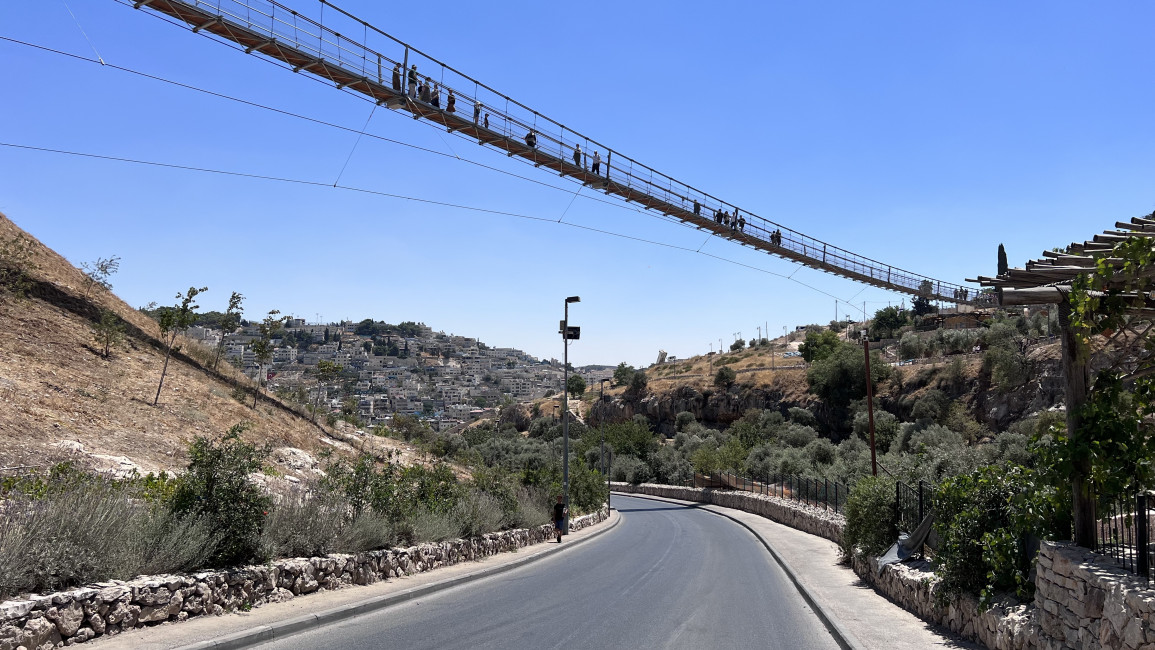A bridge, an archaeological site and a biblical garden as means to advance settler agenda in Jerusalem
A suspension bridge measuring 202 meters in length was recently inaugurated for public use over Wadi el-Rababeh in Silwan in occupied East Jerusalem.
The Israeli-run Jerusalem municipality, the Nature and Parks Authority and a settler organisation known as the Elad Foundation have all teamed up to deliver the project located south of the Old City walls.
Silwan has long been the focus of ultranationalist religious groups such as the Elad settlers, who often determine policies both at the city level and above.
Nearly 30,000 Palestinians live in Silwan. Approximately 500 Jewish settlers also live there in different buildings that were acquired mostly in dubious deals and with government aid.
The bridge over Wadi el-Rababeh, or Valley of Hinnom, is one of several projects to bolster Elad's presence in Silwan.
In addition, the Jerusalem municipality plans to establish a 'biblical' park in the al-Bustan neighbourhood just below the 'City of David' archaeological park.
Demolition orders affecting nearly 90 Palestinian homes were issued to fulfil that vision. In the municipality records, the neighbourhood's name was changed to 'Gan Hamelekh' (King's Garden) on the assumption that it was a garden for Israelite kings thousands of years ago.
'Biblical Disney land' to obscure displacement
Critics charge the bridge is just one piece in a bigger scheme guided by the settlers of the Elad Foundation, whose aim is to take over the green spaces cultivated by the Palestinians of Silwan and Abu Tor for generations in order to create a "biblical Disneyland" to obscure "processes of displacement."
Elad, also known as the Ir David Foundation or City David Foundation, publicly states its aim of settling Jews in Palestinian areas in occupied east Jerusalem to strengthen "the Jewish connection to Jerusalem".
The settler organisation currently operates one of East Jerusalem's politically sensitive sites, the City of David archaeological site, which is located inside the Palestinian neighbourhood of Silwan near the Al-Aqsa Mosque.
Independent archaeologists, however, hold a sceptical view about the remains found at the "City of David" site. Specifically, whether those remains really correspond to the era of King David as implied by the park's name.
Jerusalem municipality mayor Moshe Lion said millions are being invested in tourist attractions and invited Israelis and visitors from abroad to visit the bridge.
The bridge is suspended above a valley that contains ancient grave sites, a quarry, and vegetation that Palestinians have tended for centuries.
[Ibrahim Husseini/TNA]
Last year, during the olive harvest, the Israeli police intervened to disperse Palestinians attempting to gather olives in a fenced area.
Palestinian activist and resident of Silwan, Jawad Siam, said efforts to block the project did not succeed.
"It's a settler project for the use of settlers coming from an ideological background to convert Silwan lands to biblical gardens", he told The New Arab.
Siam added land belonging to several families had been confiscated in order to construct the bridge.
"It is causing a nuisance to the residents. The area is full of settlers now and their guards", he added.
More settler projects are on the way
The bridge is only a prelude to what is to come next.
In 2019, the Israeli government gave its approval to run a cable car over Jerusalem to the walls of the Old City.
The proposed cable car would shuttle some 3,000 tourists and worshippers per hour from the western part of Jerusalem to an area near the Dung Gate entrance to the eastern Old City in a four-minute ride.
Palestinians say the project would erase their heritage in areas they seek for a future state and that the planned route would place cable cars just metres above their homes in East Jerusalem.
Last year the supreme court declined to intervene to stop the cable car project.
Israeli authorities have confiscated roughly one-third of the Palestinian land occupied since 1967 to build settlements, despite them being considered illegal under international law.
More than 100,000 Palestinian residents of East Jerusalem are currently at risk of displacement, according to the UN Office for the Coordination of Humanitarian Affairs.




